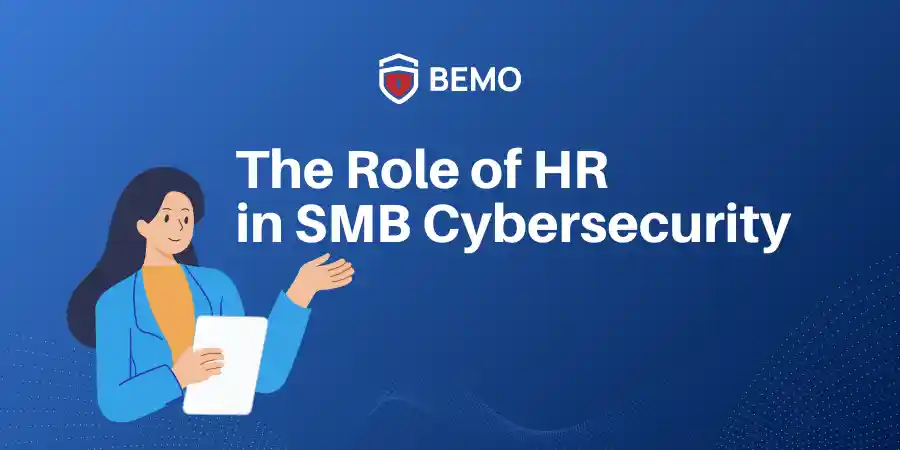3 min read
The Role of HR in SMB Cybersecurity: Protecting People, Processes, and Data
![]() Sylwia Chmielewska
on Aug 15, 2025
Sylwia Chmielewska
on Aug 15, 2025

How HR Supports Cybersecurity and Data Protection in Small and Medium-Sized Businesses
In many small and medium-sized businesses (SMBs), cybersecurity is often seen as a task for IT specialists alone. In reality, HR security is just as vital, especially in organizations where human resources security is closely connected to daily business operations.
This is my takeaway as the Head of People at BEMO, a cybersecurity and compliance provider for small businesses. Over the years, I’ve seen firsthand how HR plays a critical role in keeping sensitive employee data safe and in supporting company-wide security practices. The insights and tips I share here come directly from my experience working closely with IT, leadership, and employees to ensure security is everyone’s responsibility.
Human Resources manages sensitive employee data, oversees all stages of employment, helps ensure secure access to company systems, and protects important information to meet privacy requirements.
While HR professionals may not create technical barriers or a standalone HR security policy, their actions play a major role in human resources information security.
By putting IT security requirements into practice, HR helps protect HR data privacy and HR data security, reducing overall risk for the business.
Table of Contents
- Why Cybersecurity for HR Professionals Is Essential
- HR Responsibilities That Strengthen Security
- Cybersecurity Tips for Small Business HR Staff
- HR Security Is A Team Effort
Why Cybersecurity for HR Professionals Is Essential
It is a myth that only big businesses attract cyberattacks. SMBs are often easier targets because they may have fewer cybersecurity measures in place. Criminals look beyond financial records— HR systems hold valuable data like salary details, performance reports, and benefit information.
With sensitive employee information like Social Security numbers, banking details, and addresses stored digitally, companies face growing challenges in protecting this data from escalating threats. The rise of remote and hybrid work, an evolving legal landscape, and an increase in cyberattacks demand that HR teams prioritize robust data security measures to mitigate risks. If HR data security is compromised, identity theft, fraud, or phishing scams can quickly follow.
Human resources information security is essential for every organization. HR teams must promote safe data-handling habits and ensure that HR-related platforms and communication channels are secure.
HR Responsibilities That Strengthen Security
HR’s role in cybersecurity goes beyond basic administration. Here are some core responsibilities that help safeguard HR data privacy:
-
Set and update access controls, using role-based permissions so only authorized staff can view or change confidential HR information.
-
Select secure HR platforms equipped with encryption and compliance certifications, such as SOC 2 or ISO 27001.
-
Organize employee awareness training and include HR security topics in onboarding and ongoing education.
-
Maintain compliance with privacy laws, such as GDPR or HIPAA, and keep clear records of consent and data use.
-
Use encrypted messaging or secure portals for sharing documents, rather than regular email.
-
Ensure onboarding and offboarding steps include secure account setup and removal, with payroll and benefits data handled safely.
-
Work with IT and leadership on incident response plans if there’s ever a data breach affecting HR security.
-
Regularly review HR systems and workflows to spot and address any vulnerabilities.
-
Promote a security-first culture, encouraging all employees to follow best practices and report suspicious activity.
Cybersecurity Tips for Small Business HR Staff
Whether your company has a dedicated HR person or HR responsibilities are handled by the CEO, CFO, Office Manager, or other staff, these cybersecurity tips will help protect HR data security and privacy:
-
Always use role-based access controls for HR systems.
-
Choose HR platforms with strong encryption and compliance features.
-
Never send sensitive HR data through standard email channels.
-
Support employee awareness training programs led by IT, and keep security front-of-mind for all staff.
-
Document and routinely review all HR security steps and practices.
-
Work with IT to plan for incidents that may affect HR data privacy or security.
HR Security Is A Team Effort
HR is much more than hiring and payroll—human resources security is a key part of protecting people, processes, and data. With the right approach to HR security and data privacy, and by following proven cybersecurity tips, SMBs can strengthen their defenses and build trust with employees.
Whether HR is a dedicated department or a shared responsibility, working together with IT and leadership helps ensure sensitive information stays safe.
If your business is ready to align HR and other departments around strong security foundations, BEMO can help. As a provider of cybersecurity, compliance, and managed IT solutions for small businesses, we work with teams like yours to build a security-first culture across the organization. Contact us today to start protecting your people, processes, and data.
Top 10 Posts
-
Google Workspace to Office 365 Migration: A Step-by-Step Guide
-
Office 365 MFA Setup: Step-by-Step Instructions
-
How to Migrate from GoDaddy to Office 365
-
Migrate From Gmail to Office 365: 2024 Guide
-
CMMC Meaning : A Comprehensive Guide for Startups
-
How to remove Office 365 from GoDaddy (tips and tricks)
-
What is Microsoft Purview ? Your A to Z Guide to Getting Secure Fast
-
What is The CIA Triad?
-
How to Set Up Office Message Encryption (OME)
-
What are the 4 types of Microsoft Active Directory?


Leave us a comment!